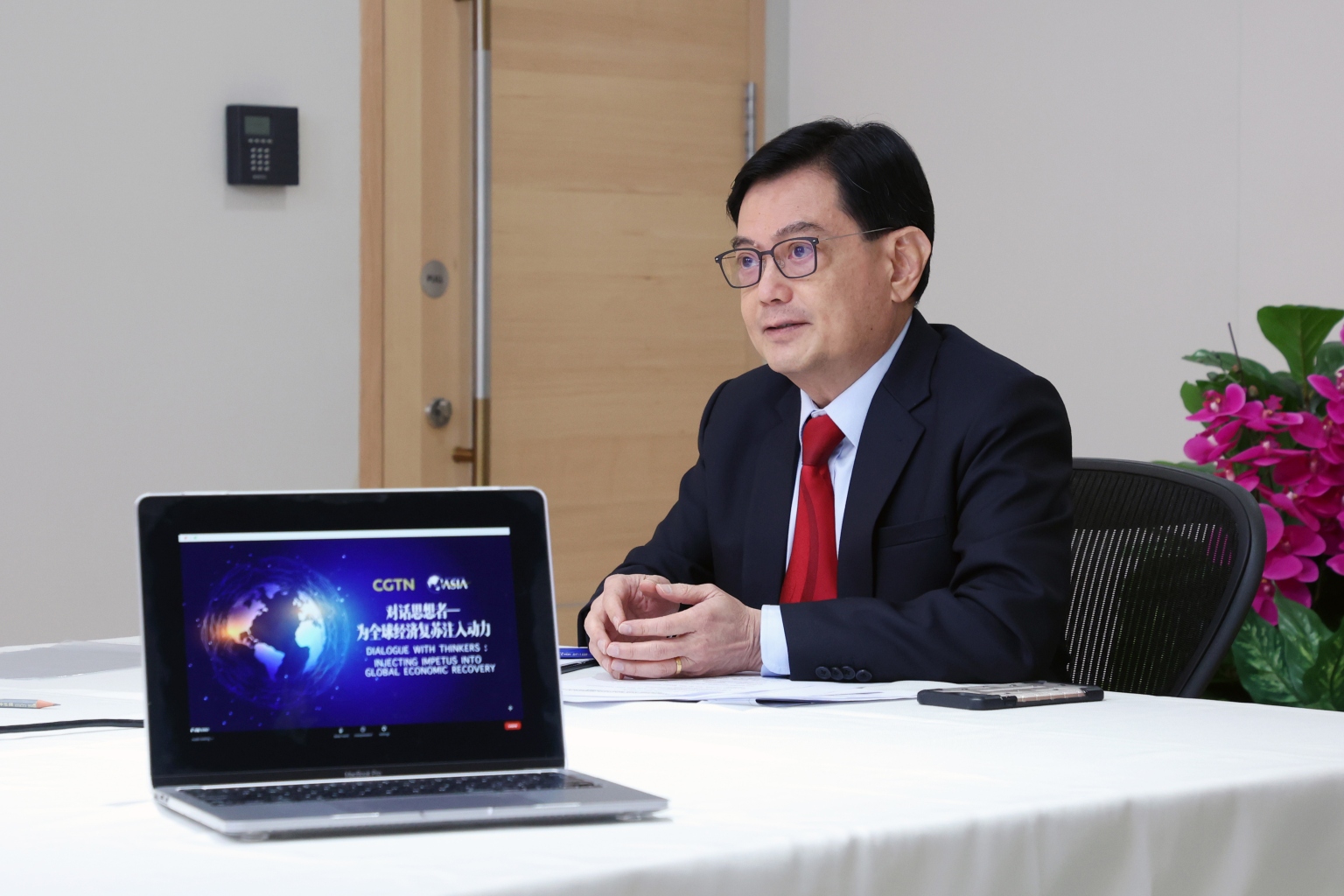Countries must deepen links, integrate economies to recover stronger from Covid-19: Heng Swee Keat
Sign up now: Get ST's newsletters delivered to your inbox

Deputy Prime Minister Heng Swee Keat dials in from Singapore to a panel session during the Boao Forum for Asia on April 20, 2022.
PHOTO: MINISTRY OF COMMUNICATIONS AND INFORMATION
Follow topic:
SINGAPORE - The Covid-19 pandemic has been a reminder of how interconnected and interdependent the world is, and while friction remains, it is key to remember that growth and prosperity are achieved through cooperation, said Deputy Prime Minister Heng Swee Keat on Wednesday (April 20).
Countries in Asia should therefore strengthen partnerships and deepen the integration of their economies, in an open and inclusive way, he added.
Speaking at a virtual panel at the annual Boao Forum for Asia, he highlighted three ways for countries to emerge stronger from the crisis.
First, they must continue to strengthen the regional architecture and partnerships.
Mr Heng noted the Regional Comprehensive Economic Partnership (RCEP) and Comprehensive and Progressive Agreement for Trans-Pacific Partnership (CPTPP) - two of the world's largest plurilateral trade agreements - are anchored in Asia.
"We continue to welcome like-minded partners to join these arrangements and remain open to new partnerships ahead," he said.
Singapore, together with Australia, Brunei, Japan, Malaysia, New Zealand and Vietnam, is a member of both pacts. China, as well as Britain, are among those who have applied to join the CPTPP.
Second, countries should harness the structural changes in the economy accelerated by Covid-19 as new sources of growth - in particular, digitalisation and a push for sustainability, he said.
Third, countries must strengthen the resilience of their economies.
"The foreseeable future will be full of uncertainty and increased volatility," said Mr Heng. "We cannot on our own be resilient, but we can better manage disruptions through stronger collaboration, especially in ensuring the flow of critical supplies in times of crisis."
The Boao Forum is held from Wednesday to Friday in Boao, Hainan, with the theme The World In Covid-19 And Beyond: Working Together For Global Development And Shared Future.
Mr Heng dialled in from Singapore for the panel session, which focused on the prospects and way forward for global economic growth in a post-pandemic world.
It was moderated by Chinese state broadcaster CGTN's talk show host Xu Qinduo.
The other panellists were Mr Jean-Pierre Raffarin, member of the Council of Advisers for the Boao Forum and a former French prime minister; Mr Romano Prodi, former president of the European Commission and former Italian prime minister; Mr Mathias Cormann, secretary-general of the Organisation for Economic Co-operation and Development; Mr Liu Zhenmin, undersecretary-general for economic and social affairs at the United Nations; Mr Marcos Troyjo, president of New Development Bank; Mr Hans-Paul Bürkner, chairman of Boston Consulting Group; and Mr Zhang Yuyan, director of the Institute Of World Economics and Politics at the Chinese Academy Of Social Sciences.
In his remarks, Mr Heng said Asia's economic prospects this year will depend very much on two factors - the continuing Covid-19 situation and the Ukraine conflict.
The global economy is still recovering from the pandemic, which has led to the worst economic crisis in a century, but Mr Heng said he remained cautiously optimistic about Asia's economic outlook for the year.
But should a new variant of concern emerge, its impact will depend on how long heightened public health measures would be required, and how strict they need to be, he added.
As for the Ukraine conflict, Mr Heng said it had highlighted the importance of critical supply sources, especially in food and energy. Alternative supply chains can provide greater resilience, but at higher costs, he added.
He noted that global inflation was already on the rise, but the Ukraine situation added fresh inflationary impulse.
"We are now faced with the prospect of opposing forces that restrain growth and raise inflation at the same time," said Mr Heng.
Central banks and fiscal authorities need to navigate the macroeconomic challenge skilfully, taking decisive monetary policy action to deal with inflation, and having targeted financial support for the most vulnerable segments of society, he added.
Beyond the near term, he noted that the risk of deglobalisation has increased with the ongoing US-China tensions, and the recent use of financial sanctions.
"We are not yet at the tipping point. The global trading system has proved quite robust despite the hurdles, with global trade at a record high last year despite the pandemic. But we cannot take this for granted," he said.
Concluding his speech, Mr Heng said that for countries to achieve their goals in digitalisation, sustainability and resilience, they must set aside differences.
"By working together, Asia and the world will not only recover from the pandemic, but emerge stronger in the post-pandemic world."

